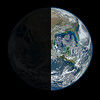Session Overview

|
What can happen if the connection between the brain and the visual system is disrupted or damaged? What can cause patients to act as if part of their world not only doesn’t exist, but couldn’t exist? In this lecture, we will discuss blindsight and neglect and see how studies on these patients have provided insights on how our brains receive and interpret information about the world. Keywords: blindsight, neglect, attention, extinction, visuospatial agnosia, hemispatial neglect, anosagnosia, right and left inattentive, parietal cortex, temporal cortex, representational theory, M. Posner. Image courtesy of NASA Goddard Photo and Video under a CC-BY license. |
Session Activities
Readings
Read the following before watching the lecture video.
- [Sacks] Chapters 4 and 8, “The Man Who Fell out of Bed” (pp. 55–58) and “Eyes Right!” (pp. 77–79).
- [K&R] Finish Chapter 3, “Sensation and Perception: How the World Enters the Mind”
Lecture Videos
View Full Video
View by Chapter
- Causes and Description of Blindsight
- Perception in Blindsight Patients
- Attention and Neglect; Measures of Neglect
- Causes and Extent of Neglect
- Attention and Extinction to Certain Stimulation
- What Information From the Neglected Field can be Processed?
Video Resources
Further Study
These optional resources are provided for students that wish to explore this topic more fully.
| TYPE | CONTENT | CONTEXT |
|---|---|---|
| Further reading | de Gelder, Beatrice. “Uncanny Sight in the Blind.” Scientific American, 2010. (PDF) | Article discussing a patient Prof. Gabrieli goes over in lecture |
| Video | “A Blind Monkey Who Sees Everything." Filmed by Nicholas Humphrey, Cambridge, 1971. | A 1971 movie of Helen, a blind monkey circumnavigating obstacles |










